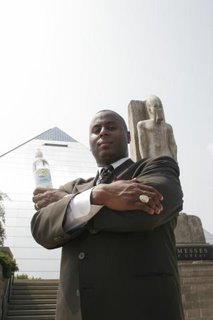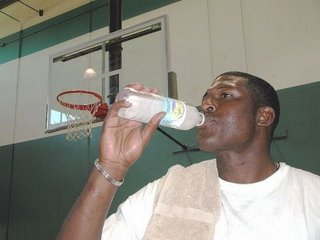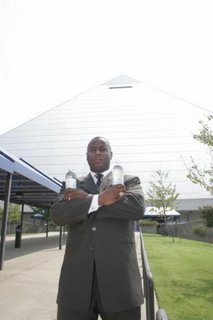Putting It All Out In The Open: Lawrence Otis Graham
hopes to get people talking with his books.A Limelight ExclusiveBy
Byron Lee In "The Socialite: The True Story of America's First
In "The Socialite: The True Story of America's First
Black Dynasty," Lawrence Otis Graham focuses on
Senator Blanche Bruce, the first black person to serve
a full term in the U.S. Senate Graham is also
launching a campaign to get the senator recognized
with a U.S. Stamp.Lawrence Otis Graham is as calm and collected in our
one-on-one interview as he is energetic and witty
during his public talk. In either form, he is always
engaging. Today, the lawyer, author, academic, and
cultural critic is at Left Bank Books (399 N. Euclid)
to promote his latest book,
"The Senator and the
Socialite: The True Story of America's First Black
Dynasty," (480 pages, Harper Collins) a book that
centers on the life and times of the Bruce family, a
saga which starts with Blanche Bruce, a slave who
becomes the first black person to serve a full term in
the United States Senate and his marriage to educator
Josephine Wilson, someone concerned with cultivating
an image of black aristocracy.

Graduate of Harvard Law, attorney, author, academic,
and cultural critic Lawrence Otis Graham has always
stirred the pot with his books. From exposing the
racism in a Connecticut country club in "Member of the
Club" to pulling back the curtain of upper class black
society in "Our Kind of People," his works have always
had people talking.Please visit www.lawrenceotisgraham.com for more info.
Graham is fascinated with the issue of bias, a
fixation that began when his noticed the struggle his
parents (Richard, a real estate developer, and Betty,
a psychologist) had when purchasing a house in
Westchester County in New York. (Although the
neighborhood opposed the family moving into the house,
The Graham's were able to remain in the house through
the help of a Rabbi from a local synagogue).
Feeding the young Graham's desire to fight for others
were the methods his parents used to ensure that he
and his brother, Richard (who is now an orthodonist)
gave back to their community.
"My parents aggressivelyworked to make sure we were dedicated to giving backto those who made it possible for us to be who wewere. We had to give a percentage of our Christmasgifts to the NAACP and the United Negro College Fund."A desire to help his community was also instilled
inside the Graham brothers through subtle methods no
doubt rooted in the experience their mother gained in
her vocation.
"Another thing my parents would do wasthat they would put pictures of people such as[Chairman of the NAACP and noted activist, politician,and academic] Julian Bond and [first black womanelected to Congress and one time Presidentalcandidate] Shirley Chisholm on the refrigerator. As afive or six year old, I didn't know who these peoplewere, but I knew that they were important." The
children also supported black leaders in a more direct
way.
"Whenever my family would spend the summer inMemphis with relatives, my mother made sure that wewere on the corner handing out leaflets wheneverHarold Ford, Sr. was running for Senate. The firsttime I was involved in a campaign as a child was whenwe were passing out leaflets for Shirley Chisholm whenshe was running in Brooklyn. Even if we [as children]didn't understand what they were doing, my parentswanted us to know that there were people out therefighting for us, and that we needed to pay tribute tothem."This curiosity with bias and a desire to discover it
on all fronts was taken to an extreme after Graham was
told in several interviews with high-ranking female
executives that, even for them, the glass ceiling was
hard to crack due to the networking that took place in
country clubs that were difficult for women to get
access to.

Graham is also the author of such books as "The Best
Companies for Minorities" and "Proversity"--two
important guides on diversity in the workplace.To discover what really went on at these clubs, Graham
left a $105,000 a year job as a lawyer and went
undercover as a bus boy in an all-white Connecticut
country club. The result, a New York magazine cover
story that was eventually expanded into the book
"Member of the Club" (1995) set off a fury within the
exclusive community exposed in its pages. "There were
people who recommended that I be fired from my law
firm, and my wife and I hired around the clock
security guards for about a month, because the people
of Greenwich, Connecticut were very powerful, very
rich, and very angry. There was this hope that the
witness to all of this, me, would not be a reliable
person, but because I had tapes, letters, and notes,
it was clear that these were some very bigoted people.
At the same time, these people were community leaders,
a couple of them were Fortune 500 executives."

Gracing the cover of New York Magazine in 1992, Graham left his New York law firm and went undercover as a busboy to expose racism, sexism, and anti-Semitism at an all-white country club in Greenwich, Connecticut.
Graham feels that his expose drove home the point that
is shared by many people who navigate the labyrinth of
corporate america:
"My question was this: 'When you'rein the office on Monday, how can you say that youdon't see color, gender, race, and ethnicity at work,but descriminate on the weekends?' My argument was thatno one is that schizophrenic. If you are a racist onthe weekends, you're a racist at work."It was his next work, however, that would prove to be,
at least in his own community, even more
controversial. 1999's "Our Kind Of People: Inside
America's Black Upper Class" discussed the families in
the upper echelon of high class black american
society. The reaction to the book was seemingly evenly
split.
"Some people were upset because they felt that adiscussion of class was not a discussion black peopleshould be having, but there are class structures inevery race and ethnicity; other people were upset thattheir families were not included in the book."Yet, Graham also found that, underneath the
dissonance, was another feeling: genuine
officiousness:
"I noticed that there was a greathunger for knowledge about these organizations. Peoplewanted to know how they started, who founded them,what were the person's reasons for starting them."Graham also notes that many of these dynasties started
out not out of personal arrogance, but communal
necessity.
"It was not someone setting out to have thefirst black funeral home; it was the fact that blackpeople could not have the bodies of their deceasedtreated at white funeral homes."Like his previous works, "The Senator and The
Socialite" uncovers a area that has not truly been
explored. Furthermore, the release is extremely timely
in that it is being released in an election year that
has the highest number of blacks running for political
office than there have been at nearly any other time
since the reconstruction.

Getting the Stamp of Approval: Please learn how you can be a part of history by clicking here.In addition to promoting the book, Graham has another
mission, that, if accomplished, could make the kind of
history that Graham is fond of researching: Graham is
trying to garner support to make Blanche Bruce the
first black elected official on a U.S. stamp in the
U.S. Postal Service's 159 years.
"[The fact that ablack elected official has never been put on a U.S.stamp]is a sad statement because there are many whiteelected officials who appear on stamps, whether theyare presidents, governors, senators, members of theHouse of Representatives, even confederates [JeffersonDavis]. The first elected woman senator [HattieCaraway] and the first hispanic american senator[Dennis Chavez] both have a stamp, but the first blacksenator has no stamp, and no black elected officialhas a stamp. I think [that a stamp] is an importantway to remember and commemorate a great leader."Graham has asked people to go to his website,
www.lawrenceotisgraham.com, where they can click on
the "Senator Bruce Postal Stamp Project" link and
either leave their name or their e-mail address. "My
plan," says Graham, "is to deliver all of these names
to the Postmaster General to try to get the Post
Office to realize that there are many other people who
believe that this is the right thing to do."
To bring Bruce's struggle as a senator (representing
Mississippi) into sharper relief, Graham points out
Bruce's battle to earn the respect of his peers, going
above and beyond the call of duty in both his personal
and professional life.
"[The establishment] lookedfor credibility [to validate his presence]in otherways, and unfortunately for them, that meant lookingat what his stand was going to be on other issues[support of Chinese immigrants], how he conducted hissocial life, how he conducted his private life, wherehe lived, who he was married to and used all those askeys to tell them 'Well, this is someone who deservesrespect.' It's unfortunate, but that's how they lookedat him."
ABOVE AND BEYOND: In order to earn the respect of his
peers, Senator Blanche Bruce had to go above and
beyond the call of duty in both his personal and professional life.Graham believes that many black politicians are being
held to this same standard, and that this is the
reason that, as there was one black senator in 1874,
there is only one in 2006 [Barack Obama of Illinois].
"There is this presumption that if you are a blackelected offical that you are going to only care aboutissues that are particularly of interest to blackpeople, that your only focus will be on the deathpenalty, or welfare issues, or affirmative actionissues, when, in fact, there are so many othereconomic and social issues that face senators andgovernors."Graham says that there is another reason that there
are few black legislators. "America finds that
threatening." In mentioning that the majority of
blacks on U.S. stamps are athletes or entertainers,
Graham adds,
"An athlete or entertainer is not goingto have the power or the authority to render decisionsthat are going to change the average person's life."Graham believes that this fear of and disbelief in the
ability of blacks to serve in government positions is
rooted in a narrow definition of blackness held by
both blacks and whites, and that this narrow
definition exists because of a paucity of positive
stories that reflect an inspirational side of the
black experience.

Roscoe Conkling Bruce was the only son of Blanche and
Josephine. Wealthy, handsome, and smart, Roscoe broke
Harvard's racial barriers as President of Harvard
Magazine.
"I lot of it has to do with the fact that there are
very few stories being told about the history of black
success, whether it is black business people, black
political people, or black intellectuals. We don't
have any shows like 'The Cosby Show' anymore. There
are not many intact black families on television with
a father who is present, where the kids go to school
and use correct diction. Also, many of the stories
about blacks are being told by non-blacks, who may not
have the sensitivity to care whether or not a
character is a positive portrayal, or if it is more
stereotyping and blaxploitation."

FOR HERSELF, OR HER PEOPLE?: Josephine Wilson, wife of
Senator Blanche Bruce, was praised in many circles for
being a wife who supported her husband's career while
also remaining determined to resume her own once he
got settled. However, she was also criticized for
being someone who was overly concerned with putting on
the airs of the aristocracy.
Graham concludes our time together by skillfully
comparing the plight faced by the Bruces in the late
1800's and early 1900's to the struggle faced by
today's upwardly mobile blacks. "They were in two
worlds. Even though they had wealth like the whites of
their time and they were able to buy themselves into
certain situations, such as having their son [Roscoe,
Sr.] attend Phillips Exeter Academy and Harvard, they
were still not allowed to eat at nice restaurants,
because Washington was a southern, segregated town.
Today's blacks are between two worlds. If a couple
wants a house in the nicest part of Clayton or Ladue,
they can get the house if they have the money, but
will they be excepted by their neighbors? Will their
children be invited to sleepovers and playdates? Also,
when the family goes to mostly black neighorhoods,
will they be excepted by the community? Leslie and
Anita Bond, the Graves family [owners of Black
Enterprise Magazine] and the Johnson family [owners of
Ebony Magazine] are some of the couples that have been
able to pull this off. They are respected in the white
community, but also loved in the black community."
Even though the subject matter in his books and essays
may put some people off, Graham hopes to start
discussion in hopes that people will both express
themselves and learn something new. "I try to persuade
people that it is better to know about everything than
to just shut down and not talk about certain things.
Let there be a dialogue. Everyone has an opinion about
these issues. I think we solve some problems when we
talk about them."
For more writings and unique insights by the cultural analyst known as Mr. Byron Lee a.k.a. Bleebus please check out his official blog @ http://www.bleebus.blogspot.com































